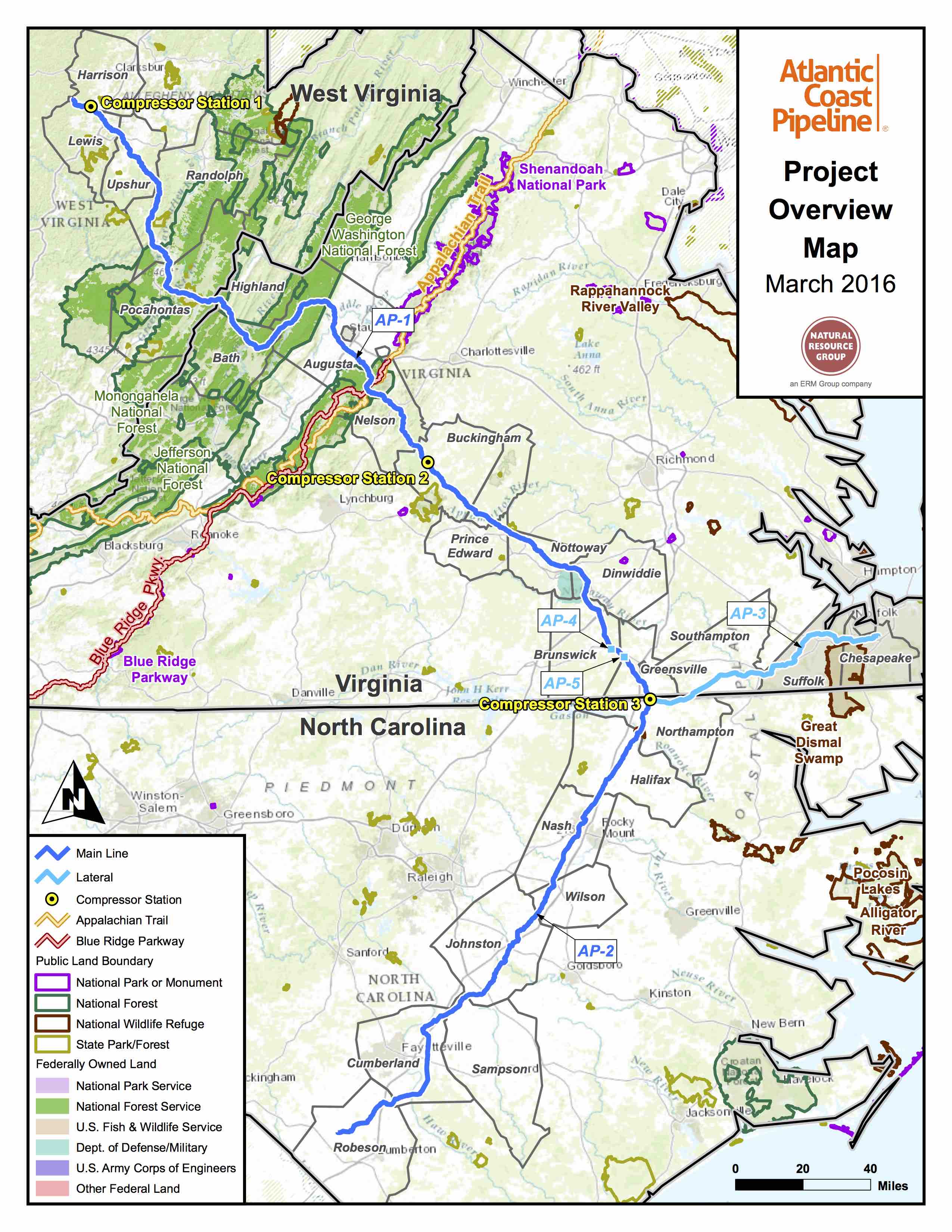Virginia Will Get $58M for Pipeline's Environmental Impacts

RICHMOND, Va. (AP) – Developers of the Atlantic Coast Pipeline have agreed to spend nearly $58 million to help offset the massive infrastructure project’s environmental impact in Virginia.
An agreement outlining the payments was signed several weeks ago by then-natural resources secretary Molly Ward and Leslie Hartz, an executive with lead pipeline developer Dominion Energy.
The approximately $5 billion, 600-mile natural gas pipeline, which has received many of its key permits, is designed to start in West Virginia and run through Virginia and North Carolina. Getting the project built will involve tree removal, blasting and leveling some ridgetops as the pipe, 42 inches in diameter for much of its path, crosses mountains, hundreds of water bodies and other sensitive terrain.
The Federal Energy Regulatory Commission, which oversees interstate natural gas pipelines, found in an environmental analysis largely favorable for developers that more than 3,400 acres of vegetation would face long-term to permanent effects, with the greatest impact on forested areas.
The funding outlined in the agreement is intended to help diminish the effects of forest fragmentation and related impacts on water quality. It’s one of four major components of mitigation efforts the state has negotiated, Deputy Secretary of Natural Resources Angela Navarro said Friday.
The company will also pay $10 million in mitigation funds for impacts to historic resources, purchase a new parcel of land for a wildlife management area and provide substitute land to the Virginia Outdoors Foundation in exchange for the pipeline crossing properties under protective easements, Navarro said.
Of the environmental mitigation money, about $38.7 million will go toward forest conservation and about $19.2 million will go toward water quality efforts. The memorandum lays out the recipients, including the Virginia Outdoors Foundation, the Charlottesville Area Community Foundation and the Virginia Association of Soil and Water Conservation Districts.
The agreement is a good deal for taxpayers and wouldn’t release the pipeline from liability should something go wrong, Gov. Ralph Northam’s spokesman, Brian Coy, said.
But opponents of the controversial project asked why the agreement wasn’t announced publicly and suggested it was done prematurely, because not all details of the state-level permitting are complete.
“The project doesn’t have all of the approvals it needs to go forward, but it looks like (former Gov. Terry) McAuliffe decided he didn’t need to wait to see the review process through to the end,” Greg Buppert, senior attorney with the Southern Environmental Law Center, said.
The agreement was signed in the last weeks of McAuliffe’s term.
David Sligh, conservation director of the nonprofit Wild Virginia, which is fighting the pipeline, said he was puzzled and disappointed that the agreement wasn’t publicly announced. He noted that North Carolina Gov. Roy Cooper’s office issued a press release last week about a similarly sized mitigation agreement with pipeline developers.
Navarro and Coy said the state doesn’t typically send press releases about mitigation agreements at this stage in the process.
Pipeline spokesman Aaron Ruby, who couldn’t immediately be reached by The Associated Press, has told media outlets developers are still negotiating a funding agreement with West Virginia.
Navarro also said the state has negotiated similar mitigation agreements for the Mountain Valley Pipeline, another natural gas pipeline that would run through a smaller chunk of the state further west. That includes a similar $27.5 million for forest fragmentation and $2.5 million for historic resources.
Related News
Related News

- Keystone Oil Pipeline Resumes Operations After Temporary Shutdown
- Biden Administration Buys Oil for Emergency Reserve Above Target Price
- Freeport LNG Plant Runs Near Zero Consumption for Fifth Day
- Enbridge to Invest $500 Million in Pipeline Assets, Including Expansion of 850-Mile Gray Oak Pipeline
- Williams Delays Louisiana Pipeline Project Amid Dispute with Competitor Energy Transfer
- Evacuation Technologies to Reduce Methane Releases During Pigging
- Editor’s Notebook: Nord Stream’s $20 Billion Question
- Enbridge Receives Approval to Begin Service on Louisiana Venice Gas Pipeline Project
- Russian LNG Unfazed By U.S. Sanctions
- Biden Administration Buys Oil for Emergency Reserve Above Target Price




Comments